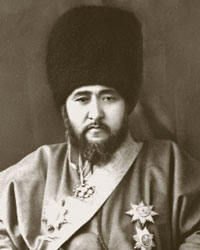SHARE WITH FRIENDS:
 Feruz, Muhammad Rahimkhan II (1845, Khiva, 1910) Khiva khan (1864—1910); poet and composer. From the dynasty of bells. He studied at the Arab Muhammadkhan madrasah in Khiva, studied the science of state and law with the famous teacher of the time, poet and scientist Doi, Yusufhoja Axun and others. Agahi taught Feruz, taught him the secrets of poetry, taught history and translation.
Feruz, Muhammad Rahimkhan II (1845, Khiva, 1910) Khiva khan (1864—1910); poet and composer. From the dynasty of bells. He studied at the Arab Muhammadkhan madrasah in Khiva, studied the science of state and law with the famous teacher of the time, poet and scientist Doi, Yusufhoja Axun and others. Agahi taught Feruz, taught him the secrets of poetry, taught history and translation.
After the death of his father Sayyid Muhammad Khan (1864) he ascended the throne of Khiva. Poems dedicated to Ogahi Feruz were written on the occasion of this event. In 1873 K.P. the Russian army, led by von Kaufmann, attacked and occupied the principal cities and capital of the khanate. According to the Treaty of Gandhimiyon (August 1873, 12), the Khiva Khanate remained dependent on Tsarist Russia. Under such difficult conditions, Feruz ruled the Khiva khanate for almost half a century. Feruz gathered literary and artistic figures in the palace. Under the influence of Ogahi, Kamil, Tabibi and others, he also wrote poems under the pseudonym Feruz (happy, victorious).
Feruz attached great importance to book work: he created the devon, wrote history, and translated works. He established a school of translation in Khorezm. He translated the rarest historical, literary and scientific works of Persian and Arabic literature into Uzbek. During his reign, works on the history of Khorezm were written by Ogahi and Bayoni. Kamil Khorezmi invented the notation for classical maqoms. He organized a printing house in Khiva. It includes a memoir on Khorezm poets "Majmuat ush-shuaro", works by Alisher Navoi, collections of Khorezm poets.
Feruz brought unique books from abroad to Khorezm through merchants from India, Arabia, Iran and Turkey and copied them in large numbers, creating a rich library of books on history and literature. Feruz also developed arts such as architecture, painting, and calligraphy. During this period, the art of photography and cinema was created, landscaping work was carried out.
In 1871, Feruz built a two-story madrasah named after him in front of the Old Ark. Under Feruz's direct leadership and initiative, more than 2 madrasas, mosques, minarets and khanaqas were built. Feruz also paid special attention to water supply and gardening. According to his order, a large canal was built on the border of Kungrad district. Now this ditch is called "Khan ditch".
Feruz created lyrical poems in the traditional genres of classical poetry. His poems are mainly about love. Man and life, love and devotion form the ideological basis of Feruz’s creativity. They are distinguished by their melody, richness of figurative colors and variety of forms. Many of his poems were sung by musicians and singers in his time.
He arranged his poems under the name Devoni Feruz (1879). This devon was rebuilt by Muhammad Sharif (1900). Feruz himself copied 350 rubai of Pahlavon Mahmud by hand and turned them into a book. Feruz studied Shashmaqom melodies and formed a maqom ensemble in the palace. He created melodies connected with "Navo", "Dugoh", "Segoh". He is buried in the mausoleum of Sayyid Mohi Ruyi Jahan in Feruz Sayyid Mahruyjon Complex.
Copies of the collection of poems are kept in the Institute of Oriental Studies of the Academy of Sciences of Uzbekistan (inv. № 3442, 1119).
Habib Abdunazar, Ibrahim Karimov.